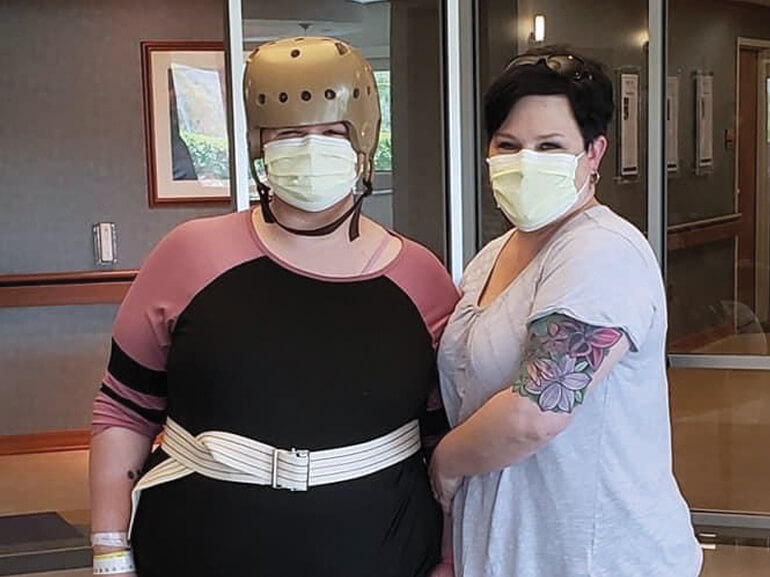Kayla's story

Feeling whole again
Kayla Reed, 18, an art student at the Pennsylvania College of Art and Design, was at home studying when she began feeling strange. Her left arm twitched, her face drooped and she suddenly developed a severe headache. She called out to her mom, who instantly dialed 911.
When the ambulance arrived, Kayla tried to stand to get into a wheelchair, but her left leg wouldn’t work. “It felt like the left side of my body wasn’t there,” said Kayla.
She was taken to a local hospital and was immediately airlifted to Penn State Health Milton S. Hershey Medical Center for more advanced care.
Tests revealed Kayla had a stroke, most likely due to an abnormal connection between arteries and veins in her brain. Doctors surmised it had been present since birth or early childhood. Her loved ones were in shock since there was no family history of strokes.
One week later, Kayla was stable enough to be transferred to Penn State Health Rehabilitation Hospital to begin the next phase of her recovery. When she arrived, she had minimal movement in both her left leg and arm and experienced severe neglect/reduced awareness of her left side. She had difficulty with cognitive tasks and, because of swallowing issues, required a thickened liquid diet to avoid choking.
In speech therapy, her goals included “eating pizza and chugging water.” She achieved that within the first two weeks, while simultaneously working on rebuilding other strengths and skills. In cognitive rehabilitation, she performed brain exercises, including double-digit math problems, alternating between addition and subtraction and doing multiple tasks while the television was on to challenge her attention, processing and thinking abilities.
Kayla also focused on becoming independent in her daily activities. In occupational and physical therapies, she worked on improving her balance, strengthening her arm and leg through a range of hands-on exercises and specialized equipment, increasing her mobility. She even practiced getting in and out of a car. Her therapists credited Kayla’s motivation and positive attitude for helping her achieve all her goals.
As an art major, Kayla was particularly determined to regain her creative skills and worked with the recreation therapists on refining her techniques. She also found that playing games not only challenged her, but helped reinforce her cognitive gains.
In just a few weeks, Kayla had made significant progress. However, her biggest challenges were waiting for her at home. She would need to go up a full flight of stairs to get from the ground level to living area of her home. In addition, Kayla’s wheelchair wouldn’t fit through the doorways.
That’s where additional family training and problem-solving came in. Kayla’s mom was trained to help her daughter with walking, stairs and transferring from one surface to another. As for her wheelchair,
Kayla and her mother were taught how to remove the chair’s hand rims to allow for passage throughout their home. They also fitted Kayla for a custom ankle foot orthosis (AFO), which improved her walking ability.
After one month at Penn State Health Rehabilitation Hospital, Kayla had achieved all her goals. She could walk with assistance from a person or a cane and was eating a regular diet. She also was able to manage higher-level cognitive tasks, such notetaking, which she will need when she returns to school in the near future. In the interim, she will be supported by home health services as she continues to regain her independence.
Six weeks after her discharge, Kayla had surgery to fix the issue that caused her stroke. “I am whole again,” said Kayla. She is back home recovering, continuing with home therapy and improving with each passing day.